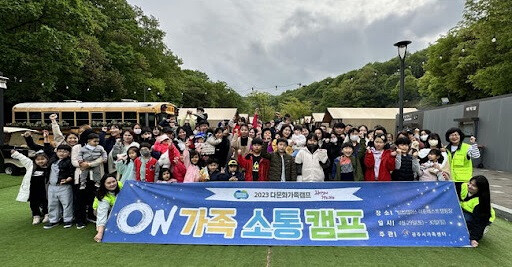
Gwangju City, Gyeonggi Province – The Gwangju City Family Center announced today, May 26th, the successful conclusion of its 'ON Family Communication Camp,' held from May 24th to 25th at the National Hoengseong Forest Retreat in Hoengseong, Gangwon Province.
This annual camp, a collaborative initiative between Gwangju City and Gyeonggi Province since 2021, aims to foster healthy family relationships and promote social integration among multicultural families. This year, the program saw the participation of 20 multicultural families from Gwangju City, totaling 67 individuals.
Participants engaged in a diverse array of experiential activities designed to enhance communication and cooperation, including a family sports day and various teamwork-building programs. These activities provided a unique opportunity for families to strengthen their bonds amidst the serene natural environment of the forest retreat.
"It was a precious time spent with my family," shared one participant, "and it served as an opportunity for us to understand each other better." The sentiment underscored the camp's success in achieving its core objectives.
Mayor Bang Se-hwan reiterated Gwangju City's commitment to its multicultural residents. "We will continue to expand practical policies and support to ensure multicultural families can stably integrate into our local community," stated Mayor Bang, emphasizing the city's dedication to creating an inclusive society.
Broader Context of Multicultural Family Support in South Korea
The 'ON Family Communication Camp' in Gwangju is indicative of a broader national effort in South Korea to address the unique challenges and needs of its growing multicultural population. As South Korea has become an increasingly diverse society, largely due to international marriages and foreign workers, the government and various non-governmental organizations have recognized the importance of robust support systems for multicultural families.
These initiatives often focus on several key areas:
Language and Cultural Integration: Many programs offer Korean language classes for foreign spouses and children, as well as cultural education to help families navigate societal norms and traditions.
Family Counseling and Support: Services are provided to help families resolve conflicts, improve communication, and adapt to cultural differences within the household. This often includes specialized counseling for multicultural couples and children facing identity issues.
Educational Support for Children: Recognizing that children from multicultural backgrounds may face unique challenges in the education system, many programs offer academic assistance, after-school care, and counseling services.
Employment and Economic Self-Sufficiency: Support is often extended to help foreign spouses find employment, providing vocational training and job placement services to enhance economic stability for the family.
Community Building and Networking: Events like the 'ON Family Communication Camp' are crucial for fostering a sense of belonging and reducing isolation. They provide platforms for multicultural families to connect with each other and with the wider Korean community, sharing experiences and building supportive networks.
Legal and Administrative Assistance: Help is often provided with immigration processes, visa renewals, and understanding legal rights and obligations in South Korea.
The South Korean government, through ministries such as the Ministry of Gender Equality and Family, plays a significant role in funding and coordinating these services. Local governments, like Gwangju City, then implement tailored programs that address the specific needs of their respective communities. The emphasis is often on early intervention and continuous support to ensure that multicultural families not only settle but thrive, contributing positively to the social fabric of the nation. These efforts reflect a growing understanding that the successful integration of multicultural families is vital for the continued development and social cohesion of South Korean society.
[Copyright (c) Global Economic Times. All Rights Reserved.]






























